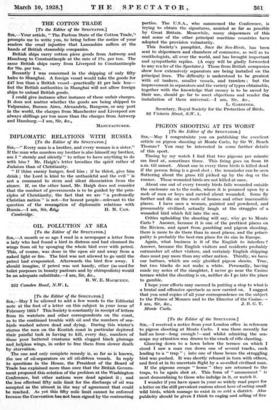[To the Editor of the SPECTATOR.]
SIR,—May I be allowed to add a few words to the Editorial note at the foot of a letter on this subject in your issue of February 18th? This Society is constantly in receipt of letters from its, watchers and other correspondents on. the coast, as to the continued trouble with oil and the numbers of sea- birds washed ashore dead and dying. During this winter's storms the men on the Kentish coast in particular deplored their painful task in having to kill, every day, numbers of these poor battered creatures. with clogged black plumage and helpless wings, in order to free them from slower death
by starvation. .
The one and only complete remedy is; so far as is known, the use of oil-Separators on all oil-driven vessels. In reply to questions in the House, the President of the Board of
Trade has explained more than once that the British Govern- ment proposed this solution of the problem at the Washington Conference, but other nations were dead against it ; and the less effectual fifty mile limit for the discharge of oil was accepted as the utmost in the way of agreement that could be reached. As yet this fifty mile limit cannot be enforced because the Convention has not been signed by the contracting
parties. The U.S.A., who summoned the Conference, is trying to obtain' the signatures, assisted as far as possible. by Great Britain. Meanwhile, many shipowners of this and some of the other principal maritime countries have adopted the provision voluntarily.
This Society's pamphlet, Save the Sea-Birds, has been sent to shipowners and chambers of commerce, as well as to ornithologists, all over the world, and has brought important and sympathetic replies. (A copy will be gladly forwarded to any realer of the Spectator.) Those from British companies show how extensively separators are being installed on the principal lines. The difficulty is understood to be greatest with oil tankers, smaller vessels, and trawlers ; but the improvement in separators and the variety of types obtainable, together with the knowledge that money is to be saved by their use, should go far to meet objections and render tha installation of them universal.—I am, Sir, &e., L. GARDINER, Secretary, Royal Society for the Protection of Birds.
82 Victoria Street, S.W. 1.


























































 Previous page
Previous page